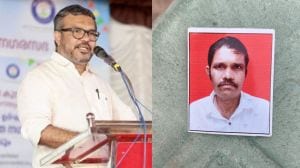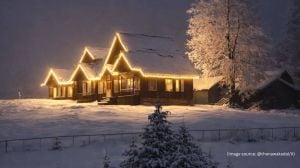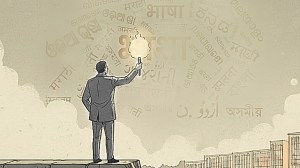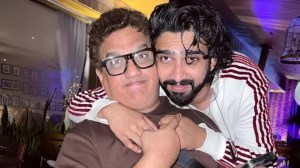Rising costs, shortened House sessions, falling Muslim representation: The highs and lows of politics in 2022
Cong's Bharat Jodo Yatra set an ambitious 3,500-km target, even as BJP hit its with highest-ever total in Gujarat
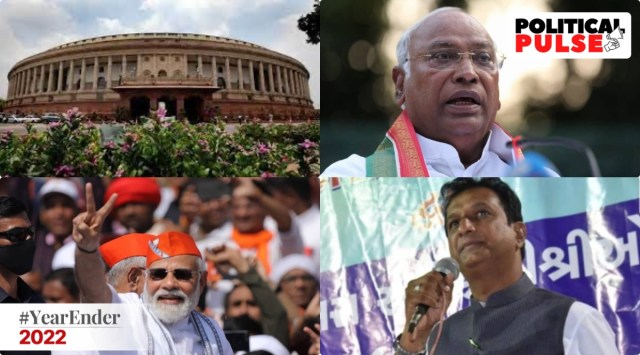 From the amount spent on the Assembly elections to the single Muslim MLA in the 182-member Gujarat Assembly, here is the story of this year’s major political events via numbers.
From the amount spent on the Assembly elections to the single Muslim MLA in the 182-member Gujarat Assembly, here is the story of this year’s major political events via numbers. From the amount spent on the Assembly elections to the single Muslim MLA in the 182-member Gujarat Assembly, here is the story of this year’s major political events via numbers.
Rs 344 crore
An analysis by The Indian Express of expenditure reports submitted to the Election Commission by parties showed that the BJP spent over Rs 344.27 crore in the polls held in five states – Uttar Pradesh, Punjab, Goa, Manipur and Uttarakhand – in February and March. The amount was nearly 58 per cent higher than the Rs 218.26 crore the party spent in these states five years ago. The Congress also recorded a sharp increase in its poll expenditure in the states, with the Rs 194.80 crore spent in 2022 over 80 per cent higher than the Rs 108.14 crore it spent in 2017.
Eighth Parliament session cut short
The Winter Session of Parliament ended prematurely on December 23, after a 13-day run marked by the passage of seven Bills, and protests and walkouts by the Opposition over not being allowed to debate contentious issues, particularly the clash between Indian and Chinese troops at the Tawang sector of Arunachal Pradesh. The session was originally scheduled to end on December 29, after 17 sittings.
The previous Monsoon Session of Parliament, held between July 18 and August 8, saw a productivity rate of only 47 per cent and 42 per cent for the Lok Sabha and Rajya Sabha, respectively, as per data by PRS legislative research. The session eventually ended three days before schedule – the seventh consecutive time the Parliament session was cut short – amid protests by the Opposition over issues such as price rise, the Agnipath scheme, and the alleged misuse of central probe agencies by the Centre. The two Houses held 16 sittings each.
’40 per cent commission’
With the election heat rising in Karnataka, the Congress focused on the Basavaraj Bommai government in the state with a charge of “40 per cent commission” charge. In July 2021, the president of the Karnataka State Contractors’ Association, D Kempanna, wrote a letter to Prime Minister Narendra Modi alleging large-scale corruption in the award and implementation of civil contracts in Karnataka and that contractors were being forced to pay a 40% commission to officials in the BJP government, cutting across departments, for projects. The contractors’ association repeated the claim again a year later.
The Opposition seized on the figure, with the Congress launching a series of publicity campaigns targeted at the BJP government. Posters with QR codes and pictures of Bommai stating “PayCM” sprung up across Bengaluru, especially as the Bharat Jodo Yatra made its way through the state. During Bommai’s visit to Telangana that month, banners also appeared in Hyderabad saying, “Welcome to 40 per cent commission CM”.
3,500 km
Advertised as its first “mass-contact programme” in years, the Congress’s Bharat Jodo Yatra led by Rahul Gandhi is on its way across the country, and by next month, is expected to cover 3,500 km, over 150 days, 12 states and two Union territories. Having covered around 3,000 km over 100 days, the Yatra will next move to Uttar Pradesh, Haryana and Punjab, before wrapping up in Jammu and Kashmir. Since Rahul set off on September 7, the padyatra has made headlines almost every day, with the BJP questioning its claims of fighting hatred and uniting India.
50% reservation
This is the Supreme Court-mandated ceiling on the amount of reservations, but at least two states have passed orders this year that breach the limit. The Karnataka Assembly unanimously passed a Bill proposing to increase reservations for Scheduled Castes from 15 to 17 per cent, and Scheduled Tribes from 3 to 7 per cent, ahead of the 2023 polls. The total reservation in the state now stands at 56 per cent. The same month, the K Chandrashekar-led government in Telangana pressed ahead with its promise to increase reservation for Scheduled Tribe communities from 6 to 10 per cent, increasing the total quota in the state to 54%. Tamil Nadu, Maharashtra, UP, Chhattisgarh and Madhya Pradesh already have over 50 per cent reservation, with Chhattisgarh’s proposal to increase it further stuck right now with the Governor.
37 MLAs
When Eknath Shinde unveiled an unthinkable rebellion in the Shiv Sena against the mighty Thackerays, the biggest question was how would he escape the anti-defection law? In the end, as Shinde camped in Guwahati, under the BJP’s protection, he got as many as 37 MLAs to his side, leaving just 16 with the Uddhav Thackeray-led faction, well past the two-third mark to avoid the anti-defection law. In June, Shinde became the CM of Maharashtra, leading a coalition government with the BJP.
21 years
The number generated a lot of buzz in political circles for it was this long period that the Congress held its first presidential election. The last time a contest took place for the post of Congress chief was back in 2001, when Jitendra Prasada contested against Sonia Gandhi. Senior party leader Mallikarjun Kharge ended up becoming the first non-Gandhi party president in about 24 years this October. The Congress’s slow and protracted build-up to its presidential election became the target of BJP attacks, with the party dismissing the whole thing as “cosmetic and an eyewash”, and saying the Gandhi family continued to retain real power in the party. A BJP spokesperson likened the process to “a Mughal sultanate-style coronation”. Know to nominate its party presidents, the BJP does not have much to boast about either – as some pointed out.
25 lakh J&K voters
The Union Territory of Jammu and Kashmir has not had an elected government since mid-2018. In August, indicating that this might change soon, the Election Commission announced a special summary revision of electoral rolls, with Chief Electoral Officer Hirdesh Kumar saying that around 25 lakh new voters are expected to be enrolled in the Union Territory. While he clarified that those “ordinarily” residing in J&K and having achieved the age of 18 or above as on October 1 would be included, as was the case in the rest of the country, the figure was enough to create a furore in the Valley, which remains sensitive to attempts to “change its demographics”. “Is the BJP so insecure about support from genuine voters of J&K that it needs to import temporary voters to win seats?” National Conference leader Omar Abdullah tweeted.
PDP chief and former chief minister Mehbooba Mufti said the government seemed set to delay polls in the UT. She said the “egregious gerrymandering tilting the balance in BJPs favour & now allowing non locals to vote is obviously to influence election results. Real aim is to continue ruling J&K with an iron fist to disempower locals”. She also called the change in voter enrolment rules “an extension of the ‘tactical rigging process’ that started with the unconstitutional and illegal delimitation process in J&K”.
Over 50 per cent share
In December, the BJP stormed back to power in Gujarat for the seventh consecutive time winning 156 of the 182 Assembly seats. Its vote share in the 2017 Assembly elections five years ago was 49.05 per cent. Sweeping the state in 2022, in its best performance ever, the party got a 52.50% vote share.
As many as 42 Congress candidates and 128 of the Aam Aadmi Party (AAP) forfeited their deposits. In 19 seats where the BJP won by huge margins, both the Congress and AAP lost their deposits. Such was the scale of the BJP victory that more than 1,200 of the 1,621 candidates in the race lost their deposits.
Single Muslim MLA
The only Muslim MLA in the 182-member 15th Gujarat Assembly now is Imran Kheda, the sitting Congress MLA from Ahmedabad’s Jamalpur-Khadia. The Muslim community makes up 9.67 per cent of Gujarat’s population. There were three Muslim MLAs, all from the Congress, in the 14th Gujarat Assembly.
Muslim representation in the Lok Sabha is also abysmally low. Currently, there are 26 Muslims among the total 543 MPs in the Lok Sabha – making their representation 4.78 per cent, against 14.7 per cent share in the country’s population. The highest representation of Muslim MPs in the Lok Sabha is from the Trinamool Congress, which has five Muslim MPs, followed by the Congress, at 4. The BJP does not have any Muslim MP.
- 01
- 02
- 03
- 04
- 05








